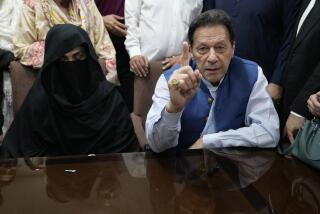Curtain Finally About to Come Down on Malaysia’s Scandalous Court Drama
- Share via
KUALA LUMPUR, Malaysia — After nearly two years of scandal and lurid revelations, the courtroom sex saga of former Deputy Prime Minister Anwar Ibrahim is nearing a close, leaving this conservative country a bit shellshocked.
Ariffin Jaka, who is both judge and jury, abruptly ended the marathon trial in late June and ordered lawyers to submit closing arguments in writing. He hopes to rule this month on whether Anwar sodomized his chauffeur as charged and, if so, on the punishment. Once Malaysia’s second-most powerful man, Anwar denies all charges. He could receive 20 years in prison but would be spared caning because he is older than 50.
Defense lawyers say privately that their client doesn’t have a prayer of being found not guilty and that they already are planning an appeal. They say Anwar, 52, was set up by Prime Minister Mahathir Mohamad, 74, and other senior officials who felt threatened by Anwar’s popularity and power and have a stake in making sure that he is convicted. The lawyers’ skepticism is not surprising, given the unusual nature of the court proceedings.
Anwar originally was charged with having committed “carnal intercourse against the order of nature” in May 1994. When the defense showed that the apartment building where the alleged offense took place was uninhabited at the time because of construction, the government changed the date to May 1992, citing a typing error.
But Anwar had alibis for every night that month, so the government amended the charges again--a tactic that is legal under Malaysian law--to say the offense occurred “one night between the month of January and March 1993 at about 7:45.”
Using Anwar’s diaries, passport and official documents, the defense created what one Western diplomat called a seamless argument: Anwar was either out of the country or performing official duties in public at that hour during all three months in question.
In addition, the chauffeur, Azizan abu Bakar, who apparently testified against Anwar in closed court, later said police had instructed him to change the date of the alleged sex act. Another man with whom prosectors charge Anwar had sex, his adopted brother Sukma Darmawan, said his confession had been coerced by police investigators during 80 hours of interrogation. And one defense witness told the judge that he had been offered a large bribe by a Malaysian diplomat to smear Anwar with sexual innuendoes.
Anwar was arrested--and beaten by the police chief--in September 1998, after being sacked by Mahathir and leading about 30,000 anti-Mahathir protesters through the streets of this normally tranquil capital, demanding reform. He is serving a six-year prison sentence on abuse-of-power charges related to the sex scandal. His trial on those charges was widely criticized by human rights monitors and resulted in a backlash of public sympathy for Anwar at the expense of Mahathir.
The government’s intent clearly is to get Anwar off the national radar screen. But the affair continues to haunt Mahathir, Southeast Asia’s longest-serving leader, at every turn, even though the reform movement that Anwar started and that his wife--Wan Azizah Wan Ismail, an eye doctor with no prior political experience--has kept going seems to be petering out. The movement’s membership has shrunk to 300,000 in a country of nearly 22 million, and its leadership is split on the course of future goals.
The movement, the National Justice Party, was designed as a social force around two personalities, Anwar and his wife, but it has had little success in developing a broad-based political agenda. A rally in April to commemorate the anniversary of Anwar’s initial sentencing drew only a few hundred supporters, a far cry from the heady days when thousands took to the streets almost daily to protest official corruption and a lack of openness in Mahathir’s 2.7-million-member United Malays National Organization. UMNO has ruled Malaysia since independence from Britain in 1957.
Mahathir, who has been prime minister for 19 years, was reelected in November for what he says will be his last term. But the backlash over the Anwar affair cost him votes with the Malay majority, and political uncertainty resulted in a surge of strength for the Pan-Malaysian Islamic Party. PAS, as it is known, wants to turn Malaysia into a strict Muslim state and bans fairs and pop concerts, prohibits liquor and requires women to wear veils. It now governs two of Malaysia’s 13 states.
Anwar’s party appears to have lost its momentum because the government has succeeded in denying him a public platform--even his family is allowed to visit him in jail only every three weeks. And the fact that the economy is rebounding from the regional doldrums of the late ‘90s has proved more captivating to most Malaysians than political reform.
The cantankerous but politically adroit Mahathir also has a career’s worth of chips he can call in: He has delivered stunning development and created an ethnically and religiously harmonious society.
More to Read
Sign up for Essential California
The most important California stories and recommendations in your inbox every morning.
You may occasionally receive promotional content from the Los Angeles Times.













